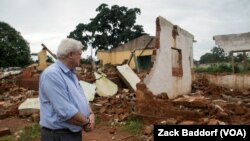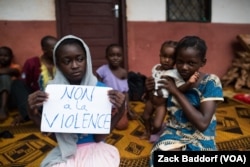U.N. humanitarian chief Stephen O'Brien said Tuesday he saw "the early warnings of genocide" during a recent visit to Central African Republic, which has faced sectarian fighting since 2013.
He said in an interview with The Associated Press that "there's a terrible development of militias now using ethnic or religious" reasons for attacks. He spoke with AP after briefing the U.N. Security Council on his trip behind closed doors at the request of France.
During a visit to the southeastern town of Bangassou last month, O'Brien said, he saw 2,000 Muslims trapped in a Catholic church where they fled after their homes were burned by mostly Christian anti-Balaka militiamen who were "just lying in wait to kill them if they tried to move." By contrast, he said, "every Christian family's house was left standing."
Central African Republic, one of the world's most impoverished nations, has been wracked by violence since predominantly Muslim Seleka rebels overthrew the Christian president in 2013 and seized power. Anti-Balaka militias fought back, resulting in thousands of deaths, the displacement of hundreds of thousands more and the flight of many Muslims to the country's north or across the border into Chad and Cameroon.
Despite peaceful elections in early 2016, violence has continued. Sectarian fighting has moved into the country's central and southeastern regions, prompting warnings of a national conflict roaring back to life. More than 300 people have been killed and over 100,000 displaced since May.
'Early warnings are there'
O'Brien's report to the Security Council follows a warning from U.N. Secretary-General Antonio Guterres in late July that hard-won gains toward lasting peace in Central African Republic are threatened by fighting in the country's southeast and heightened ethnic tensions.
But the U.N. humanitarian chief went further on Tuesday, saying: "The early warnings of genocide are there."
O'Brien noted Central African Republic is twice the size of France, with only 1,300 kilometers (810 miles) of paved roads and just over 12,000 U.N. peacekeepers mandated to protect civilians.
He said that "there are massive flare-ups" not only in Bangassou but in Obo and Bria, also in the southeast, and "the concern is that there's no control."
"The escalation is very real," O'Brien said. "We're looking at things which we haven't heard about for a long time. There's a very deep ethnic cleansing approach."
Peacekeepers targeted
He said he felt very strongly it was his special duty to tell the Security Council what he saw in Bangassou, where U.N. peacekeeping troops from the Muslim country of Morocco are based. Those peacekeepers "were being described as a legitimate target by the various [Christian] militias who saw them as partial to protecting the Muslim community they were trying to get rid of," he said.
O'Brien said the response to the Moroccan peacekeepers was "totally wrong," saying the U.N. force is there to protect all civilians, regardless of their backgrounds.
He said all Security Council members are deeply concerned about escalating ethnic tensions and violence in the Central African Republic.
O'Brien said the government controls only the capital of Bangui and the surrounding area, leaving a pressing need for finding "a way of enforcing some sort of government authority" everywhere. The international community also must find "a very clear, practical methodology to get these individuals to lay down their arms," he said.
As for humanitarian aid, he said, increased donations are necessary for helping those forced from their homes by the conflict.






